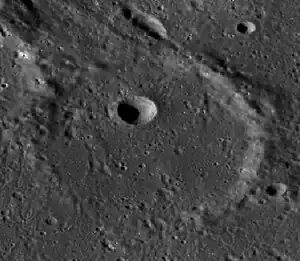 LRO mosaic | |
| Coordinates | 43°06′N 47°12′E / 43.1°N 47.2°E |
|---|---|
| Diameter | 42 km |
| Depth | None |
| Colongitude | 42° at sunrise |
| Eponym | Hans C. Ørsted |
Oersted is a lunar impact crater that has been flooded by lava, leaving only a crescent-shaped rim with a gap to the southwest. The rim climbs to a maximum height of 1.7 km. This feature lies to the southeast of the crater Atlas, and southwest of Chevallier. To the south-southwest is Cepheus.
The northern rim of Oersted is overlain by a broken, lava-flooded craterlet. Just to the south is a younger, still-intact crater named Oersted A that was formed after Oersted was flooded. To the northwest, the flooded crater Oersted P is attached to the northwest arm of the outer rim.
Satellite craters
By convention these features are identified on lunar maps by placing the letter on the side of the crater midpoint that is closest to Oersted.
| Oersted | Latitude | Longitude | Diameter |
|---|---|---|---|
| A | 43.4° N | 47.2° E | 7 km |
| P | 43.6° N | 46.0° E | 21 km |
| U | 42.4° N | 44.6° E | 5 km |
References
- Andersson, L. E.; Whitaker, E. A. (1982). NASA Catalogue of Lunar Nomenclature. NASA RP-1097.
- Blue, Jennifer (July 25, 2007). "Gazetteer of Planetary Nomenclature". USGS. Retrieved 2007-08-05.
- Bussey, B.; Spudis, P. (2004). The Clementine Atlas of the Moon. New York: Cambridge University Press. ISBN 978-0-521-81528-4.
- Cocks, Elijah E.; Cocks, Josiah C. (1995). Who's Who on the Moon: A Biographical Dictionary of Lunar Nomenclature. Tudor Publishers. ISBN 978-0-936389-27-1.
- McDowell, Jonathan (July 15, 2007). "Lunar Nomenclature". Jonathan's Space Report. Retrieved 2007-10-24.
- Menzel, D. H.; Minnaert, M.; Levin, B.; Dollfus, A.; Bell, B. (1971). "Report on Lunar Nomenclature by the Working Group of Commission 17 of the IAU". Space Science Reviews. 12 (2): 136–186. Bibcode:1971SSRv...12..136M. doi:10.1007/BF00171763. S2CID 122125855.
- Moore, Patrick (2001). On the Moon. Sterling Publishing Co. ISBN 978-0-304-35469-6.
- Price, Fred W. (1988). The Moon Observer's Handbook. Cambridge University Press. ISBN 978-0-521-33500-3.
- Rükl, Antonín (1990). Atlas of the Moon. Kalmbach Books. ISBN 978-0-913135-17-4.
- Webb, Rev. T. W. (1962). Celestial Objects for Common Telescopes (6th revised ed.). Dover. ISBN 978-0-486-20917-3.
- Whitaker, Ewen A. (1999). Mapping and Naming the Moon. Cambridge University Press. ISBN 978-0-521-62248-6.
- Wlasuk, Peter T. (2000). Observing the Moon. Springer. ISBN 978-1-85233-193-1.
This article is issued from Wikipedia. The text is licensed under Creative Commons - Attribution - Sharealike. Additional terms may apply for the media files.